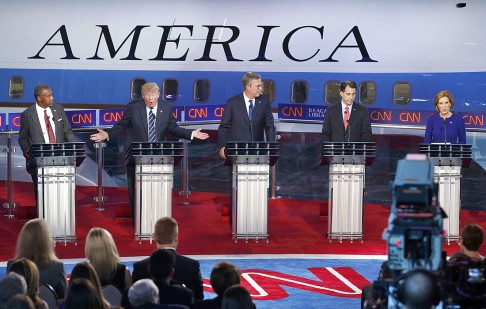
Hillary Clinton's wrestle with China: From women's rights to South China Sea, her history with Beijing has spanned decades
As the Democratic race steps up a gear with the first debate, the front runner is unlikely to pull her punches over Beijing during her campaign

With President Xi Jinping readying for a landmark speech at a UN conference last month, Hillary Rodham Clinton pretty much grabbed the mic.
In a message to her 4.4 million Twitter followers, the presidential hopeful called out the Chinese leader for speaking on women's rights after detaining feminists at home. "Shameless," she wrote, signing the missive with an emphatic "-H."
The tone of the tweet, and the furious response it generated, are telling. When it comes to Clinton and China, things are complicated - a dynamic worth exploring heading into the Democratic presidential debate this morning Hong Kong time.
Will Clinton, echoing the "shameless" comment, come out swinging?

In what CNN recently called her "most iconic moment", the then-first lady delivered what's now considered a landmark speech, declaring "Women's rights are human rights", and without naming China, blasting governments that deny women the right to plan their own families, force abortions or have women sterilised against their will.
For Beijing, it was an affront - too direct and, it felt, profoundly hypocritical. The speech was censored, and within days, the state-backed media was on the attack, lambasting the US for its own record on women.
But the remarks went over well in the US. In a September 6 1995 editorial, the New York Times praised her as "unwavering", venturing her "unflinching" speech "may have been her finest moment in public life".
Clinton wrote in detail about the event in her 2003 memoir, Living History.
"Pushing the envelope in this speech meant being clear about the injustice of the Chinese government's behaviour," she wrote.
Susan Shirk, a deputy assistant secretary of state during the Clinton administration who is now chair of the 21st Century China Programme at the University of California at San Diego, witnessed the Clintons' 1998 visit to China and said the optimism of that era still shaped Hillary Clinton's thinking.
"At that time, everybody had this positive feeling that our policy was enabling China to move in a positive direction, but we haven't felt that way in a long time," she said.
As the public face of the US "pivot to Asia", Clinton, as secretary of state, was tasked with projecting American power in Asia-Pacific - a role that bolstered her reputation for dogged diplomacy but did little to endear her to the Chinese.
In Hanoi in 2010, Clinton, on her fifth trip to Asia since becoming secretary of state in 2009, told delegates at a regional security conference that competing maritime claims in the South China Sea were a "national interest". The comment prompted a furious response from the foreign minister, who called it an "attack on China" .
Kim Ghattas, a BBC correspondent and author of The Secretary: A Journey with Hillary Clinton from Beirut to the Heart of American Power, said the tone "surprised" China, but was consistent with Clinton's strategy as secretary of state.
"Her overriding approach to any relationship with China or others was to project American power and to make sure America is at the table for all conversations," Ghattas said.
The tough talk was coupled with close engagement with Chinese counterparts, said Ghattas. "The strategy was work with them on what you can, and work around them with civil society to promote your values agenda."
The case reminded Clinton of the "responsibility to make sure our country remains the beacon for dissidents and dreamers all over the world", she wrote in the 2014 memoir. (Chen later offered a less rosy account of her role.) Beijing, meanwhile, was furious.
When Clinton passed the baton to John Kerry, the English-language edition of China Daily said: "Clinton always spoke with a unipolar voice and never appeared interested in the answers she got. Kerry understands the true multipolar nature of the 21st century world."
China has thus far played a rather minor role in Clinton's campaign, but it is likely to get more attention, particularly in light of the country's recent economic turmoil and the Trans- Pacific Partnership (TPP), which Clinton once backed but now says she opposes.
Both Shirk and Ghattas believe that Clinton will continue to take a strong but "pragmatic" stance, speaking out on rights issues without tipping the overall balance of bilateral ties.
Though calling Xi "shameless" did not help her reputation among Chinese netizens, Clinton still seems as willing as ever to speak up. When Chinese state media denounced her "ignominious shenanigans" and called her a "rabble rouser", Clinton shot right back.
"If China believes defending women's rights is 'rabble rousing'," she said in a statement, "then they can expect much more of it from me."
Points of view
What Republican candidates have said about China:
I have been doing business in China for decades, and I will tell you that yeah, the Chinese can take a test, but what they can't do is innovate. They are not terribly imaginative. They're not entrepreneurial, they don't innovate. That is why they are stealing our intellectual property.
-Carly Fiorina
Look around the world today. Every source of instability on this planet is created by a tyranny. It's the North Koreans, the Chinese, the Russians, radical Islamists and Iran. What do all five of them have in common? They are all tyrannies. None of them are democracies obviously … They're all serial violators of human rights.
-Marco Rubio
That is an issue that we can handle militarily by going out there and making sure that we show them that we don't respect their claims to these artificial islands in the South China Sea that they're building, that they're saying are theirs, that are hundreds and hundreds of miles from the coast of China and are clearly in international waters.
-Chris Christie
I've been telling everybody for a long time China is taking our jobs, they're taking our money.
-Donald Trump
For decades, China has focused on competing with the US and unfortunately our so-called leaders have no plan. I would approach things differently. The US needs to use our natural resources to our advantage. China sure has been doing so. We can compete with China on labour rates because of our efficiency and shipping costs. But frankly, the federal government … has been hindering domestic business to the benefit of the Chinese.
-Ben Carson
I will ensure that US policy toward China better reflects the full range of concerns we have with Beijing's actions. This would begin with highlighting China's repression of ethnic minorities, religious believers, and dissidents and human rights defenders who desire nothing more than the realisation of their most basic human rights. This is true, of course, for the people of Hong Kong who have seen Beijing attempt to subvert their autonomy and thwart their democratic aspirations.
-Ted Cruz
The Chinese attacked our government and hacked into the lives of 4 million Americans. The response and retaliation to this behaviour is simple - America should hack the Chinese government.
-Mike Huckabee

